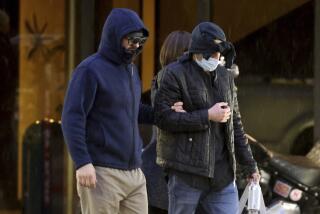Report on North Lost in FBI Files : Investigator Cites 1985 Efforts to Aid Contras
- Share via
WASHINGTON — The FBI’s chief investigator said Friday that if he had known of Lt. Col. Oliver L. North’s 1985 efforts to obtain cash for Nicaragua’s contra s, he would have referred the matter to the Justice Department for possible criminal action.
“The Department of Justice should have considered” the matter, said Oliver B. Revell, the FBI’s executive assistant director for investigations.
Told FBI Agents
North, then a White House National Security Council aide, told FBI field agents on July 18, 1985, about his secret efforts to assist private fund-raising efforts for the contras at a time when Congress had forbidden U.S. aid to the rebels.
But through “a glitch” in the FBI’s communications system, Revell told reporters, the Teletype message reporting North’s interview with the field agents did not reach bureau headquarters.
Instead, the message remained in field office files until it was unearthed last month by agents assigned to relay any mention of North to the Senate Intelligence Committee, which was considering FBI Director William H. Webster’s nomination to head the CIA.
The delay may have saved North’s operation. Webster has confided to associates that knowledge of North’s secret activities could have made him more receptive to later warning signs about North’s work--and possibly brought the FBI into the case earlier.
In the 1985 interview with FBI agents, North described how he used consultant Richard R. Miller to contact a self-described Saudi prince about a large sum of money that the prince wanted to contribute to the contras.
“Inasmuch as U.S. public law forbid (sic) expenditures of government funds to aid Nicaraguan insurgants (sic), it was inadvisable for a member of the NSC (North) to meet with the prince directly,” the FBI Teletype message said.
‘Iranian Con Man’
Revell noted that the “prince,” Mousalreza Ebrahim Zadeh, turned out to be “an Iranian con man,” subsequently convicted of bank fraud and now serving a prison term.
Revell said the North interview would have caused him “very great concern. When he talks about using a ‘cut-out’--Miller--to solicit money from Zadeh to support the contras, that is in fact using an agent to conduct what he knew was inappropriate for himself. You can’t use an agent to do what you can’t do.”
Miller and North were accused Wednesday of being co-conspirators with Carl R. (Spitz) Channell in a conspiracy to defraud the government of tax revenue in connection with more than $2 million that was raised for the rebels through a tax-exempt foundation. Miller denied the charge, which Channell made after pleading guilty.
Reagan, McFarlane
In the 1985 interview with the FBI, North said he had discussed with President Reagan and then-National Security Adviser Robert C. McFarlane “the prince’s” interest in assisting the contras.
“To the best of our knowledge, this discussion never took place,” White House spokesman Marlin Fitzwater said Friday. “We can find no substance to the report that Oliver North discussed with the President a Saudi prince-Iranian person contributing to the contras.”
Revell said the “ad hoc” operation to raise money for the contras led to “some of the most sleazy characters you can imagine bilking people. . . . That’s one of the dangers of going outside of established organizations and channels.”
Revell, who served with North on a governmental anti-terrorism committee, said he had reservations about North’s “overzealousness” and lack of maturity. He said he was concerned that North was “acting in a very precipitous manner without considering all the consequences.”
Airliner Incident
As an example, Revell cited the October, 1985, episode in which the United States forced down over Sicily an Egyptian airliner carrying the terrorists who had hijacked the Italian cruise ship Achille Lauro and killed an American passenger.
Revell said that he and Associate Atty. Gen. Stephen S. Trott were summoned to a meeting in the White House situation room about how to retaliate to the hijacking. But by the time they arrived, he said, the decision to force down the Egyptian airliner had already been made.
“That decision was premature,” Revell said. Forcing the plane down on Italian territory would pay off, he said, only if the Italians brought charges. “They had in fact made a decision that guaranteed the terrorists would not come into American custody,” Revell said.
“There was not the kind of consultation process that would have avoided what then caused a tremendous upheaval in our relationship with Italy,” he said.
More to Read
Sign up for Essential California
The most important California stories and recommendations in your inbox every morning.
You may occasionally receive promotional content from the Los Angeles Times.









